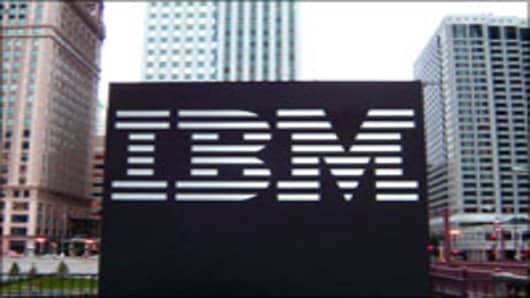In the world of technology, IBM has become the darling of darlings.
Sure, Apple is No. 1, but IBM is close behind with a near match on the way it’s valued by Wall Street based on expected earnings.
Just one slight yet significant difference: Apple’s revenues last quarter grew by 58 percent, while IBM’s barely budged at 0.3 percent, which was lower than analysts had expected.
Even on the earnings front, the two companies are night and day: IBM’s operating earnings lurched ahead at around 4 percent, while Apple turned in an explosively impressive 95.4 percent gain.
Yet the stocks of both companies are trading at or near all-time highs.
IBM gets a pass for one simple reason: For several years it has boldly articulated a five-year “roadmap” on how it will get its earnings per share to $20 by 2015. That’s 49% higher than last year. It even breaks it down how it will get there by detailing how much will come from such things as base revenues, acquisitions and share repurchases.
All investors care about is that it’s on track to meet or beat that 2015 number.
I’ve always been leery of long-term, especially those five years out, because too much can happen between here and there.
And whenever a target is at stake, there’s the concern that companies can resort to low-quality ways to hit the target.
Turns out I’m not the only one wondering about that at IBM. In the latest edition of his High-Tech Strategist newsletter, Fred Hickey raises red flags over the quality of IBM’s earnings. I’ve known Hickey for at least 20 years, and if he’s known for nothing else it’s that he doesn’t shy away pointing to the elephant in the room.
With IBM, that elephant is that it has slow-to-no revenue growth yet gets a growth valuation.
Writing in the latest issue of his newsletter, Hickey said, “Over the past five years, IBM’s revenues have barely budged ... that’s with a strong tailwind from a weaker dollar and the benefit of 55 acquisitions totaling to a cost of $17.25 billion and very few divestitures. It looks to me that real ‘organic’ growth has been negative, even throughout the economic rebound.”
Not that it matters. Last quarter, for example, investors ignored flat revenues because the company beat estimates.
Yet Hickey, in a lengthy analysis, questions the quality of the beat, noting that it came from a lower tax rate thanks largely to “a one-time benefit associated with a tax restructuring in Latin America.”
He points out another one-time gain, an accounting red flag, and how IBM wouldn’t answer his questions when he asked for more detail on the Latin America tax restructuring — not even whether it was the result of an individual country.
“What I do know is that there is risk here,” he wrote.
When I caught up with Hickey yesterday, he added, almost with dismay that “It doesn’t matter if we’re in a worldwide recession. It doesn’t matter that their service backlog is deteriorating. It doesn’t matter if the dollar is a huge headwind when it was a tailwind last year. They’ll still make the number.”
IBM, for its part, has told anybody who will listen that over the past 10 years it has been run for cash, with its profits reinvested in the business. The goal has been to avoid getting caught in a commodity trap like Hewlett Packard. In response to Hickey’s analysis, an IBM spokesman referred me to the company’s roadmap in its annual report.
Right now investors are believing it. Doesn’t mean they always will. What is clear is that with the valuation IBM gets, there is zero room for error.
All of which should make the company’s earnings next Wednesday that much more interesting.
Correction: IBM's revenue during the last quarter was misstated in an earlier version of this story.
Editor's Note: A prior version of this article included a quote not meant for publication. It has been removed.
Questions? Comments? Write to HerbOnTheStreet@cnbc.com
Follow Herb on Twitter: @herbgreenberg
Find Herb on Google+
Subscribe to Herb athttp://www.facebook.com/herb.greenberg



